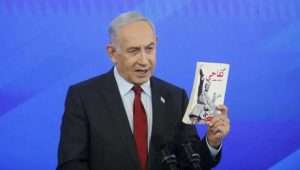Liberal Israelis and most Palestinian Arabs are never pleased when a new right-wing government takes power in the Jewish state. But the new government that came into being on Monday night was especially appalling to rivals.
The three election campaigns over the past year made clear that the top three issues were:
- A referendum on Prime Minister Benjamin Netanyahu’s continued rule, in particular now that he is under criminal indictment;
- Whether or not Israel’s Jewish character should be enshrined in law;
- Annexation of the Jordan Valley.
Left-wing Israelis are furious that Netanyahu will remain prime minister and get a chance to advance his agenda on the other two points thanks to Benny Gantz, who until a couple weeks ago was the leader of the opposition and the face of the “Just Not Bibi” movement.
Palestinian Prime Minister Mohammed Shtayyeh decried what he called an “annexation government” that will effectively bring about the end of the “two-state solution and the dismantling of the rights of the people of Palestine as established under international law and resolutions.”
Many secular right-wingers were also none-too-pleased. Represented largely in the figure of Avigdor Liberman, they have long expressed displeasure over Netanyahu’s reliance on, and therefore overreaching concessions to, the ultra-Orthodox political parties.
While Liberman had insisted on a unity government between Netanyahu and Gantz, the coalition that emerged on Monday was a far cry from what he envisioned, given that Netanyahu’s bloc remains dominant and partnered with the ultra-Orthodox.
“This is another government of Netanyahu and his Haredi-messianic bloc with a fig leaf of two senior generals,” Liberman wrote on Facebook, referring to the fact that both Gantz and his number two, Gabi Ashkenazi, are former IDF chiefs of staff.
Unideal, fragile, but necessary
Netanyahu and Gantz on Monday finally hammered out a unity coalition agreement that both men say is necessary to enable Israel to successfully weather the coronavirus crisis.
The key points of that agreement are as follows:
- Netanyahu will remain prime minister for 18 months, then in September of 2021 will hand the reins to Gantz, who will govern for the final 18 months;
- The government will initially have 32 ministers, with the number swelling to 36, the most in Israel’s history, as soon as the coronavirus crisis has ended. The ministerial portfolios will be equally split between Netanyahu and Gantz, even though the latter brings far fewer Knesset seats into the coalition;
- For its first six months, the government will focus solely on the coronavirus crisis and its effects. Legislation on all matters not related to the coronavirus will be shelved until after the crisis has ended;
- After July 1, assuming the coronavirus crisis has abated, the government will bring to a vote the annexation of the Jordan Valley and other parts of the West Bank, in accordance with US President Donald Trump’s so-called “deal of the century.” But, coalition members will be free to vote as they see fit on the matter;
- Netanyahu’s right-wing bloc will enjoy greater influence over the judicial system with effective veto power over judicial appointments and the installment of Likud MK Yariv Levin, a critic of the Supreme Court, as the new Speaker of the Knesset;
- Gantz’s “Blue and White” will control the powerful Knesset House Committee, which steers the legislative agenda in parliament.
Netanyahu’s right-wing bloc brings 53 MKs to the coalition, even without the right-wing Yamina party that has threatened to join the opposition over concessions made to Gantz.
Gantz’s party and allies bring another 19 MKs, meaning the new government has a solid 72-seat majority in Knesset. But, while the situation might look stable, it is anything but.
Ideologically, the two blocs remain very much divided, especially on the three top electoral issues listed above. There is a very justified concern that Israel could find itself once again facing early elections should Netanyahu’s criminal trial go against him, the right-wing bloc begin to throw its weight around, the left-wing bloc get cold feet on annexing the Jordan Valley, or a hundred other possibilities.
In other words, despite having the numbers, this is one of modern Israel’s more fragile governing coalitions.















